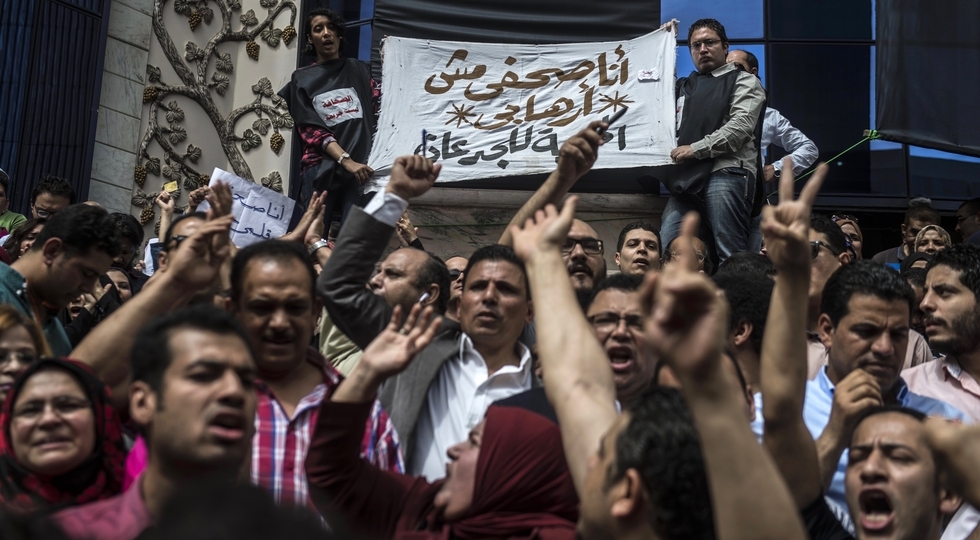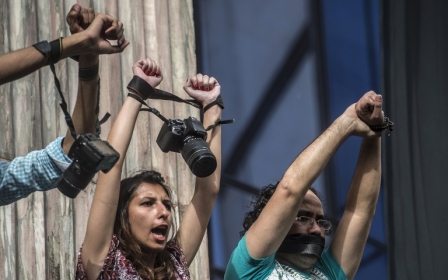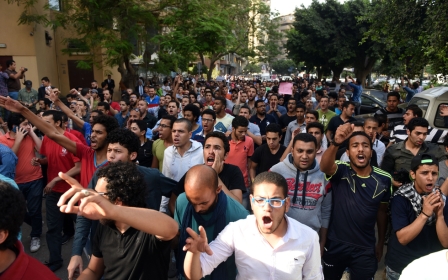Egypt intensifies its war against political opponents

Egypt’s government claims that it is engaged in a war against terrorism. While this may be partially true - Egypt is fighting affiliates of the Islamic State group (IS) in the Sinai Peninsula - it is also deeply misleading. Egypt is engaged in a comprehensive war against the political opposition. This has never been more clear.
On Saturday, an Egyptian court sentenced six people, including three journalists, to death for allegedly leaking state secrets to Qatar. It would be impossible to view the latest verdicts outside of the larger context of Egypt’s legal system.
Saturday’s verdicts are the latest in a long line of absurd, fundamentally unjust Egyptian court rulings. In 2014, a court sentenced 529 Egyptians to death for the alleged killing of one police officer. Leaving aside for a moment the absurdity of a mass death sentence, the court’s conduct was farcical in other ways: the defence was not allowed to present evidence for individual defendants, and the trial lasted less than two hours. Later in 2014, a court sentenced 683 people to death after another mass trial. Further underscoring the absurdity of the verdict, some of those sentenced to death in that trial were either already dead or in jail at the time alleged crimes were carried out.
Causes of scorn
Unsurprisingly, the 2014 mass death sentences were widely condemned by human rights groups and political scientists. But these mass trials were not the only causes of scorn.
In 2015, Egypt executed six young men for violence against police. Human rights groups presented evidence, including Egyptian court documents, showing that all six men were innocent; they couldn’t possibly have committed the crimes for which they were convicted because all had been detained and in police custody prior to the violent crime for which they were sentenced being carried out.
Earlier this year, an Egyptian court sentenced a three-year-old boy to life in prison for a crime he was alleged to have committed when he was 17-months old. The boy’s father served several months in prison and then escaped authorities before public uproar forced the government to backtrack.
In 2014, an Egyptian court sentenced Al-Jazeera journalists to multiyear prison sentences on terrorism-related charges. During that trial, ludicrous evidence of guilt was presented, including video highlights from one journalist’s family vacation in Europe and an unrelated news report about Somalia.
Political groups banned
This much should be clear: Egypt’s court is doing the bidding of the nation’s military-backed government, which is engaged in an all-out war against political opposition. As part of the Egyptian government’s war against such opposition, leading political groups have been formally banned from politics, opposition television networks have been shut down, and a draconian protest law has been used to arrest and imprison thousands. Egypt’s security apparatus has also done its part, killing hundreds of unarmed protesters in plain view.
What is perhaps remarkable, or unremarkable, depending on how one views American foreign policy, is that US political leaders continue to give Egypt’s government the benefit of the doubt.
In the midst of news of mass killings and mass arrests in 2013, US Secretary of State John Kerry famously argued that Egypt’s military was “restoring democracy". Since 2013, the Obama administration has waived restrictions that would prevent the United States from continuing to fund Egypt’s military. Since Egypt’s 2013 military coup, billions of dollars have continued to flow from Washington to Cairo.
If history is any indication, Washington’s support for the Egyptian government will continue regardless of conditions on the ground and in spite of human rights violations. On Wednesday, Egypt’s president, Abdel Fattah al-Sisi, said Egypt shouldn’t be required to respect widely accepted notions of human rights. Although it will likely say otherwise, the Obama administration doesn’t disagree with Sisi.
No one should be surprised if Egypt’s highest religious authority, the Grand Mufti, approves Saturday’s sentences against journalists. Egyptian religious authorities have offered up consistent and passionate support for the current government. There are, of course, religious authorities who are critical of the government, but they have either been arrested or silenced, the government now passes out scripted Friday sermons that must be followed strictly.
Egypt’s pattern of human rights abuses, consolidation of power, and eliminationism will likely continue; the government is in too deep to slow up. But systematic repression will likely be unsustainable in the long run. As I’ve argued elsewhere, it is probably a matter of when, not if, a critical mass of Egyptians takes to the streets to demand another change in power.
- Dr Mohamad Elmasry is an Assistant Professor in the Department of Communications at the University of North Alabama.
The views expressed in this article belong to the author and do not necessarily reflect the editorial policy of Middle East Eye.
Photo: A group of Muslim students take selfies before Republican presidential candidate Donald Trump made a speech at a campaign rally on 5 March, 2016 in Wichita, Kansas. During the speech, after they voiced some protests, they were removed from the convention centre (AFP).
- See more at: http://www.middleeasteye.net/columns/mainstreaming-islamophobia-anti-muslim-hostility-not-just-conservative-phenomenon-105761593#sthash.5l0KSgOf.dpuf- Dr Mohamad Elmasry is an assistant professor in the Department of Communications at the University of North Alabama.
The views expressed in this article belong to the author and do not necessarily reflect the editorial policy of Middle East Eye.
Photo: Journalists hold a banner reading in Arabic: "I am a journalist not a terrorist" during a demonstration outside the Journalist Syndicate headquarters in Cairo on 4 May, calling for the sacking of the interior minister two days after an unprecedented police raid to arrest two reporters. (AFP)
New MEE newsletter: Jerusalem Dispatch
Sign up to get the latest insights and analysis on Israel-Palestine, alongside Turkey Unpacked and other MEE newsletters
Middle East Eye delivers independent and unrivalled coverage and analysis of the Middle East, North Africa and beyond. To learn more about republishing this content and the associated fees, please fill out this form. More about MEE can be found here.





